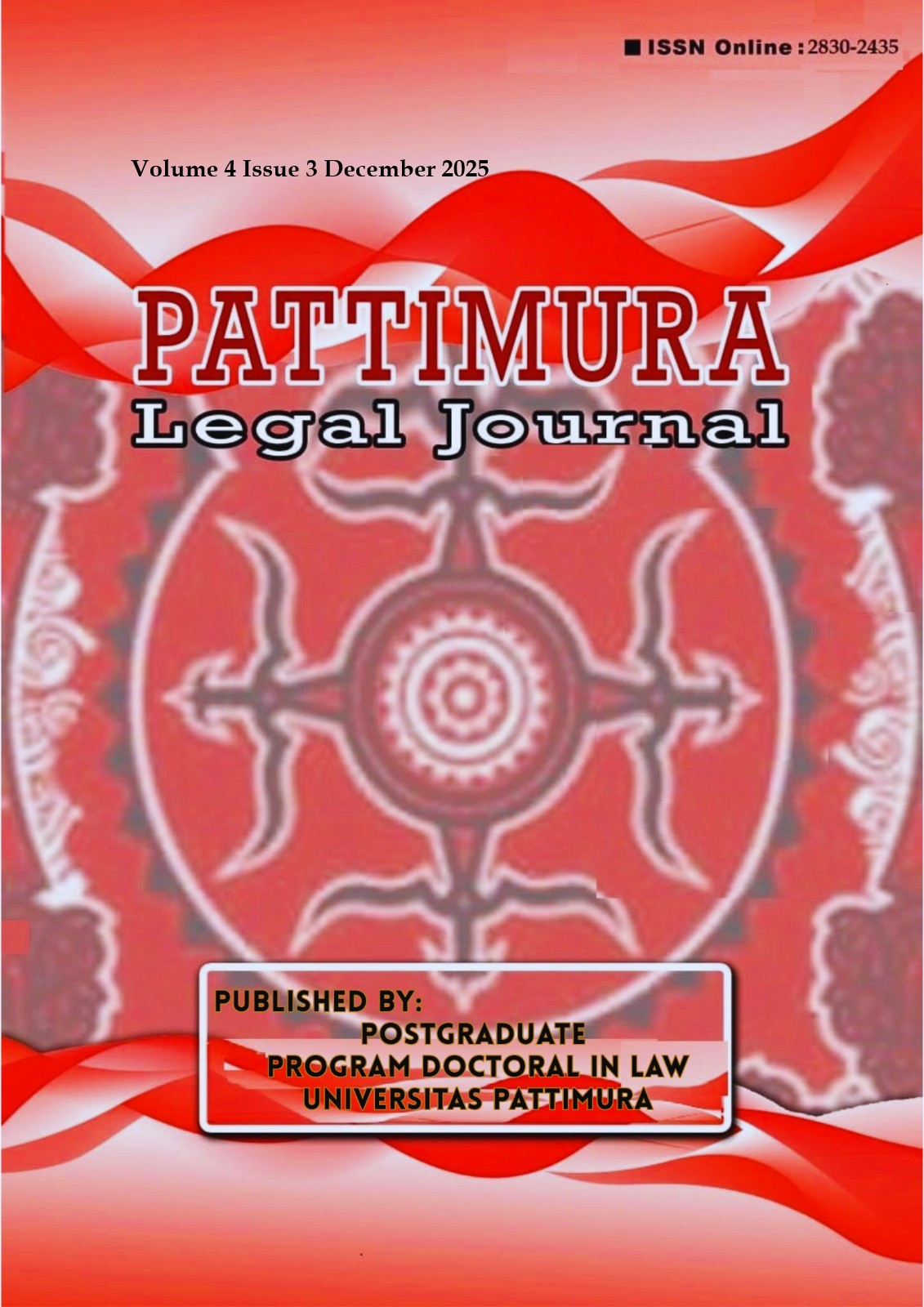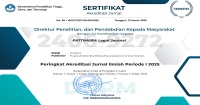Legal Frameworks for Carbon Taxation: A Comparative Study of Indonesia and Japan
Abstract
Introduction: The comparison of carbon tax regulations between Indonesia and Japan is highly relevant, considering that Japan has implemented a carbon tax policy earlier, on a larger scale, and with varying rates for different types of carbon emissions. By analyzing this comparison, Indonesia is expected to identify a more effective approach to reducing carbon emissions without hindering economic growth.
Purposes of the Research: The purpose of this legal comparison is to evaluate and propose a unification of carbon tax policies in Indonesia that better align with domestic conditions and needs, by taking into account the experiences of other countries, particularly Japan. This unification aims to create a more efficient and equitable carbon tax system that can support Indonesia’s efforts in achieving its carbon emission reduction targets This unification aims to create a more efficient and equitable carbon tax system, and can support Indonesia's efforts to meet its carbon emission reduction targets.
Methods of the Research: This study uses a normative method with a comparative approach. The primary legal material used is a comparison between the Indonesian legal framework and the Japanese legal framework. Comparative analysis is focused on law in the context by using a micro approach, i.e. a comparison of legal norms.
Results Main Findings of the Research: This research contributes to the legal and policy discourse on carbon taxation by providing a comparative analysis between Indonesia and Japan, focusing on how regulatory design and economic instruments can balance environmental goals with industrial competitiveness. The study finds that while Japan’s carbon tax operates within a mature regulatory framework supported by strong institutional coordination and public compliance, Indonesia’s system remains at a formative stage, requiring detailed implementing regulations and clear emission accounting mechanisms. Both countries share the objective of promoting low-carbon transitions, but differ in tariff structure, policy maturity, and economic adaptability. Japan’s experience demonstrates that consistent policy enforcement and alignment with renewable energy incentives enhance effectiveness, a lesson Indonesia can adopt to balance environmental protection with sustainable economic growths.
Downloads
References
Abban, Olivier Joseph, and Yao Hong-xing. “What Initiates Carbon Dioxide Emissions along the Belt and Road Initiative? An Insight from a Dynamic Heterogeneous Panel Data Analysis Based on Incarnated Carbon Panel.” Environmental Science and Pollution Research International 28, no. 45 (2021): 16–35. https://doi.org/10.1007/s11356-021-14779-5.
Adebayo, Tomiwa Sunday. “Do CO2 Emissions, Energy Consumption and Globalization Promote Economic Growth? Empirical Evidence from Japan.” Environmental Science and Pollution Research International 28, no. 26 (2021): 14–29. https://doi.org/10.1007/s11356-021-12495-8.
Aghabalayev, Faig, and Manzoor Ahmad. “Does Innovation in Ocean Energy Generations-Related Technologies in G7 Countries Reduce Carbon Dioxide Emissions? Role of International Collaboration in Green Technology Development and Commercial and Monetary Policies.” Environmental Science and Pollution Research International 30, no. 6 (2022): 45–64. https://doi.org/10.1007/s11356-022-23081-x.
Ahmadi, Younes, Akio Yamazaki, and Philippe Kabore. “How Do Carbon Taxes Affect Emissions? Plant-Level Evidence from Manufacturing.” Environmental & Resource Economics 82, no. 2 (2022): 285–325. https://doi.org/10.1007/s10640-022-00678-x.
Alisyahdi, D. F., & Rahman, D. Z. "Re-Regulating Indonesian Stock Buybacks: Lessons from the United States’ Tax Cuts". Yuridika, 36 no. 3, (2021) 549–568. Https://Doi.Org/10.20473/Ydk.V36i3.26826.
Anggia, P. "The Influence of International Tax Policy on the Indonesian Tax Law". Yuridika, 35, no 2, (2019), 343–362. Https://doi.org/10.20473/Ydk.V35i2.16873.
Arimura, Toshi H. “International Efforts on Climate Change and Carbon Pricing in Japan,” 123–45. Springer Nature Singapore, (2024). https://doi.org/10.1007/978-981-97-2187-0_9.
Asakawa, Kenji, Kouichi Kimoto, Shiro Takeda, and Toshi H. Arimura. “Double Dividend of the Carbon Tax in Japan: Can We Increase Public Support for Carbon Pricing?,” 235–55. Springer Singapore, (2020). https://doi.org/10.1007/978-981-15-6964-7_13.
Bie, Fan, Yixin Xiong, Liequan Zhou, Yunni Li, and Xiao Pei. “Role of Credit Subsidies and Financial Intermediation in China and Japan: Implications for Green Economic Growth.” Economic Change and Restructuring 56, no. 3 (2023): 25–41. https://doi.org/10.1007/s10644-023-09501-z.
Binti Mohd Ariffin, R. A., Abd Ghadas, Z. A., & Bin Md Radzi, S. N. "Enhancing Consumer Benefit Via Special Tax Scheme for Social Enterprise". Yuridika, 38, no 2, (2022). 285–304. Https://Doi.Org/10.20473/Ydk.V38i2.45360.
Burke, J. Martin, Firel, Michael K. "Understanding Federal Income Taxation (Second Edition)". New York: LexisNexis., n.d (2005).
Cao, Liu, Akira Toyohara, You Li, and Weisheng Zhou. “Willingness to Pay for Carbon Tax in Japan.” Sustainable Production and Consumption 52 (2024): 427–44. https://doi.org/10.1016/j.spc.2024.11.004.
Chen, Ningkang, Xiaofei Qin, and Shuai Zhong. “Economic and Carbon Emission Assessment of Compostable Plastics as a Substitute for Petrochemical Plastics: A Case Study in Yunnan Province.” Environment, Development and Sustainability, (2024). https://doi.org/10.1007/s10668-024-05000-x.
Colpan, Asli M., Andrew Delios, and Takashi Hikino. “How Does Export Commitment and Product Diversity Affect the International Scope-Firm Performance Relationship?: Evidence from Japan.” Asian Business & Management 12, no. 1 (2012): 142–72. https://doi.org/10.1057/abm.2012.32.
Ding, Ding. “The Impacts of Carbon Pricing on the Electricity Market in Japan.” Humanities and Social Sciences Communications 9, no. 1 (2022). https://doi.org/10.1057/s41599-022-01360-9.
Gokhale, Hemangi. “Japan’s Carbon Tax Policy: Limitations and Policy Suggestions.” Current Research in Environmental Sustainability 3 (2021): 100082-. https://doi.org/10.1016/j.crsust.2021.100082.
Golovina, Ksenia. “Procuring, Crafting, and Sensing: Affect and Material Practices of Russian Women in Japan.” Vestnik of Saint Petersburg University. History 63, no. 2 (2018): 488–505. https://doi.org/10.21638/11701/spbu02.2018.211.
Helminen, Marjaana. "The International Tax Law Concept of Dividend" . Alphen Aan Den Rijn: Kluwer Law International., (2010).
Johan, A. The Income Tax of Breadwinner Wives in Indonesia: Law and Economics Approach. Yuridika, 39, no 2, (2024). 153–180. https://doi.org/10.20473/ydk.v39i2.49979,” n.d.
Li, Aitong. “The Pending Commitment and Ongoing Political Divide on Carbon Pricing in Japan.” Climate Policy 23, no. 7 (2023): 872–84. https://doi.org/10.1080/14693062.2023.2237491.
Nugraha, H. A., Rosidin, F. A., Hutama, W. R., & Wiratama, M. G. "The Authority Concerning the Collection of Groundwater Taxes After the Law No. 23 Year 2014 in the City of Surabaya". Yuridika, 35 no 3, (2020), 519–532. https://doi.org/10.20473/ydk.v35i3.17880,”
Oestreicher, Andreas, Hammer, Markus. "Taxation of Income From Domestic and Cross - Border Collective Investment : A Qualitative and Quantitative Comparison . : Switzerland., (2014).
Oliver, Philip D. Tax Policy: Readings and Materials. New York: The Foundation Press., (1996).
Pechman, Joseph A. Federal Tax Policy (Fifth Edition). Washington DC: The Brooring Institution., (1987).
Pistone, Pasquale. "The Impact of Community Law on Tax Treaties: Issues and Solution". The Hague: Kluwer Law., (2002).
Saidi, Muhammad Djafar. Pembaruan Hukum Pajak (Edisi Revisi). Jakarta: RajaGrafindo Persada., (2007).
Sarwirini., Fika Rahmayanti. TESIS (1490) - "Bank Indonesia Sebagai Subyek Dan Objek Pajak Penghasilan". Surabaya: Fakultas Hukum Unair.,” (2011).
Suhardi, I. Penyatuan Hukum Pajak Formal Dalam Sistem Hukum Pajak Nasional. Yuridika, 31(1), 27 –. https://doi.org/10.20473/Ydk.V31i1.1960,” n.d.
Taylor, Jason. e"-Commerce Taxes Planning for the Online Retailer". USA: Cyberspace CPA, PLLC., (2018).
Valdi Sephtianeyuda Khairusy,. Sarwirini. TESIS (2742) - Tax Evasion Dalam Transaksi Jual Beli Yang Dilakukan Oleh Ppat . Surabaya: Fakultas Hukum Unair.,” (2016).
Williams, David W. Davies, "Principles of Tax Law" (5th.Ed.). London: Sweet and Maxwell., (2004).
Copyright (c) 2025 Muhammad Asrul Maulana, Savira Aristi (Author)

This work is licensed under a Creative Commons Attribution-NonCommercial 4.0 International License.
Authors who publish their manuscripts in this Journal agree to the following conditions:
- The copyright in each article belongs to the author, as well as the right to patent.
- Authors are able to enter into separate, additional contractual arrangements for the non-exclusive distribution of the journal's published version of the work (e.g., post it to an institutional repository or publish it in a book), with an acknowledgment of its initial publication in this journal.
- Authors are permitted and encouraged to post their work online (e.g., in institutional repositories or on their website) prior to and during the submission process, as it can lead to productive exchanges, as well as earlier and greater citation of published work.
- Authors have the right to self-archiving of the article (Author Self-Archiving Policy)






















